We may not have the course you’re looking for. If you enquire or give us a call on +800 312616 and speak to our training experts, we may still be able to help with your training requirements.
Training Outcomes Within Your Budget!
We ensure quality, budget-alignment, and timely delivery by our expert instructors.
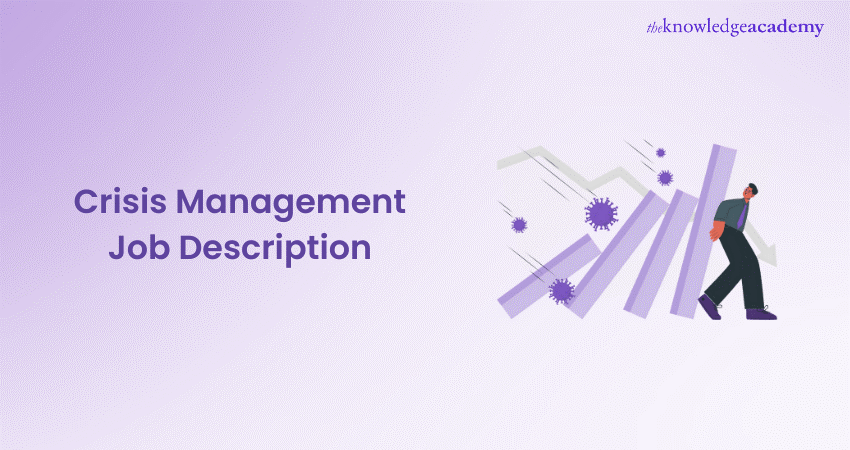
During crises, organisations and individuals depend on Crisis Case Managers for support and guidance. These professionals are crucial in helping individuals and communities navigate through challenging situations, such as natural disasters, mental health crises, or social emergencies. Given the significance of this role, it's vital for recruiters to have a well-crafted Management Job Description to attract qualified candidates.
In this blog, we will delve into the crucial roles and responsibilities of crisis managers, understand their salary structure, and discuss the career options that come with these demanding professionals. It's time to get along on this career-engaging journey!
Table of Contents
1) What is Crisis Management?
2) Crisis Manager Roles
3) Responsibilities of a Crisis Manager
4) Crisis Manager Qualifications
5) Crisis Manager Skills
6) Crisis Manager Average Salary
7) How to Get a Career in Crisis Management?
8) Crisis Management Career Options
9) Example of Crisis Manager Job Description
10) Conclusion
What is Crisis Management?
Crisis management comprises making crucial decisions in the event of threats or emergencies and effectively communicating information about these situations to the public. These professionals are specially trained to identify, anticipate, and respond to emergencies, which range from fires to security breaches.
Many businesses today create crisis management plans to ensure employee safety and protect against targeted attacks on sensitive information. These plans also address issues like computer failures, scandals, financial losses, or reputational damage. Moreover, Government agencies often focus on crisis management for issues like terrorism, war, or natural disasters.
Crisis Manager Roles
The Crisis Management Program Lead plays a pivotal role in safeguarding an organisation's resilience and stability. This professional is responsible for designing, implementing, and maintaining a comprehensive crisis management program. Their primary objective is to ensure that the organisation is well-prepared to respond effectively to potential crises, minimising risks and disruptions.
By developing robust strategies, conducting risk assessments, and coordinating response plans, the Crisis Management Program Lead ensures the organisation is equipped to handle emergencies ranging from natural disasters to operational disruptions or reputational threats. This role involves collaboration with key stakeholders, training employees, and continually refining protocols to adapt to emerging risks, making it a critical function in promoting organisational readiness and continuity.
Responsibilities of a Crisis Manager
A Crisis Case Manager has a range of responsibilities to support clients in crisis situations. Here are the key duties:
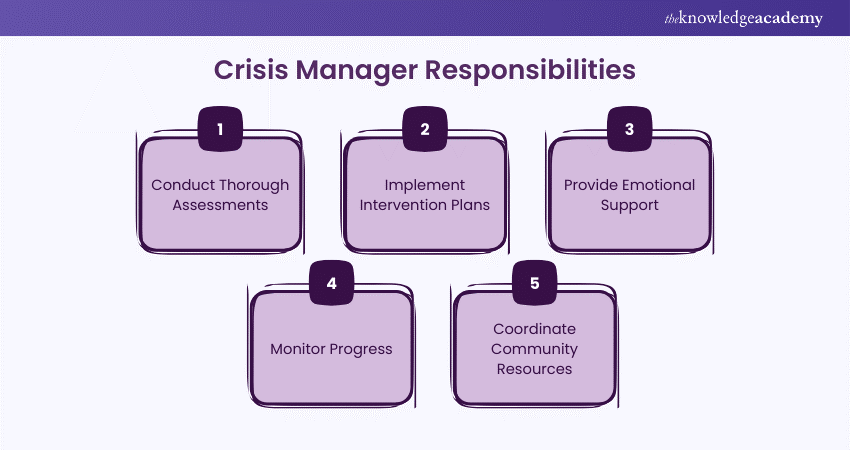
1) Conduct Thorough Assessments: Evaluate clients' crisis situations, including mental health status, safety risks, and immediate needs.
2) Implement Intervention Plans: Create and execute crisis intervention plans, providing necessary resources and referrals to support clients.
3) Provide Emotional Support: Offer crisis counselling and emotional support, using active listening to build the client's trust and rapport.
4) Monitor Progress: Track clients' progress throughout the crisis intervention process, making adjustments to plans and services as needed.
5) Coordinate Community Resources: Connect clients with community resources, such as mental health agencies, housing assistance, healthcare services, and financial support.
Crisis Manager Qualifications
To effectively manage crises, a crisis manager must possess a unique set of qualifications and skills that facilitate them to handle high-pressure situations while ensuring safety, continuity, and compliance. Below are the key qualifications for a crisis manager:
1) Proven experience in Crisis Management or other disciplines, including emergency preparedness and business continuity.
2) Strong Project Management skills.
3) Excellent Communication and Interpersonal skills.
4) Ability to work productively and calmly under pressure.
5) In-depth knowledge of relevant laws and regulations.
Crisis Manager Skills
A Crisis Case Manager must possess a variety of skills to effectively support individuals in crisis. Here are the key required skills:
1) Strong Crisis Management Skills: Ability to think and make the right and situation-driven decisions quickly, especially in regard to high-pressure situations.
2) Empathy and Compassion: Non-judgmental attitude with the ability to provide emotional support to individuals in the event of a hardcore crisis.
3) Knowledge of Crisis Intervention Techniques: Knowledge about Improving Mental Health practices. These involve de-escalation strategies and safety planning.
4) Familiarity with Community Resources: Knowledge of services available for individuals in crisis.
5) Proficient Computer Skills: Experience with case management software and electronic documentation systems.
Enhance team performance with our expert Performance Management Course- Join today!
Crisis Manager Average Salary
The salary of the Crisis Manager depends on their experience levels, the location of their work, the local job market and regional inflation rates. Here is a brief overview of the Crisis Manager’s salary structure:
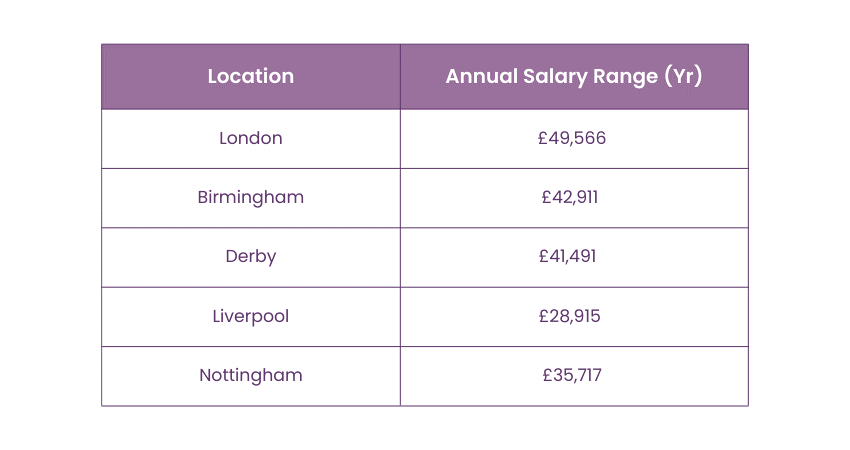
Ref Source: Indeed
How to Build a Career in Crisis Management?
While the steps may vary across specific industries, here are some general steps for starting a career in Crisis Management:
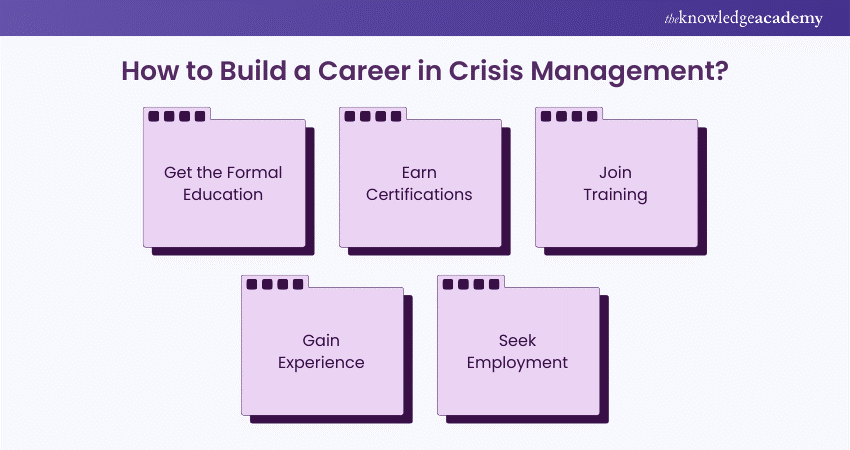
1) Get the Formal Education
Educational requirements differ across industries, and some positions may require graduate-level education, such as a Master of Science in Emergency Management. Aspiring Crisis Management professionals typically earn a bachelor's degree in fields, including emergency management, public administration, and public relations. Other relevant degrees include fire science, crisis and Disaster Management, journalism, English, business, and communications.
2) Earn Certifications
Certifications can enhance your qualifications. Professional associations, like the Institute for Crisis Management, offer programs covering topics such as identifying risks, anticipating problems, evaluating vulnerabilities, gaining senior management support, essential communication tools, recovery plans, and prioritising actions. Other valuable certifications include Certified Business Continuity Management Professional (CBCMP).
3) Join Training
Universities and colleges offer courses to improve communication skills and teach crisis management techniques. For example, The Institute for Public Relations provides recommendations on crisis communication courses and best practices guides. Many institutions offer a Certificate in Principles of Public Relations supervised by the Universal Accreditation Board.
4) Gain Experience
Build your Portfolio Management and resume by gaining hands-on experience. Internships with crisis management professionals, starting a blog to share your expertise, or working in a company's communications department are excellent ways to gain valuable experience and insights.
5) Seek Employment
There are various paths to employment in crisis management. Some professionals start their own crisis consulting firms, contracting with companies and organisations. Others work directly for a company in a crisis management role or join agencies that assist multiple companies with their crisis management needs.
Crisis Management Career Options
Crisis management professionals are needed across various industries, from private businesses to the federal government. Here are some career options within crisis management:
1) Crisis Management Specialist: Typically works for corporations, responding to emergencies to minimise damage to the business's public image. They handle crisis planning duties, such as developing and implementing emergency plans and communicating with the media. They can be generalists or specialise in specific areas as part of a team.
2) Emergency Management Director: Develops preventative crisis plans and emergency response plans for businesses. They recognise potential crisis signals, prepare for crises, and plan recovery strategies. They work with officials like law enforcement during emergencies and may also coordinate training programs for emergency response.
3) Public Relations Specialist: Focuses on external communication during and after emergencies. They draft statements, create press releases, and coordinate with the media to share vital information. In government or legislative roles, they are often referred to as press secretaries.
4) Crisis Intervention Specialist: Acts as a counselor to help with the psychological response to crises. They provide high-level care to individuals experiencing short-term crises to minimise long-term emotional damage. They may have a counseling office or travel to crisis locations and sometimes train other professionals in crisis intervention and coordinate services during emergencies.
Example of Crisis Manager Job Description
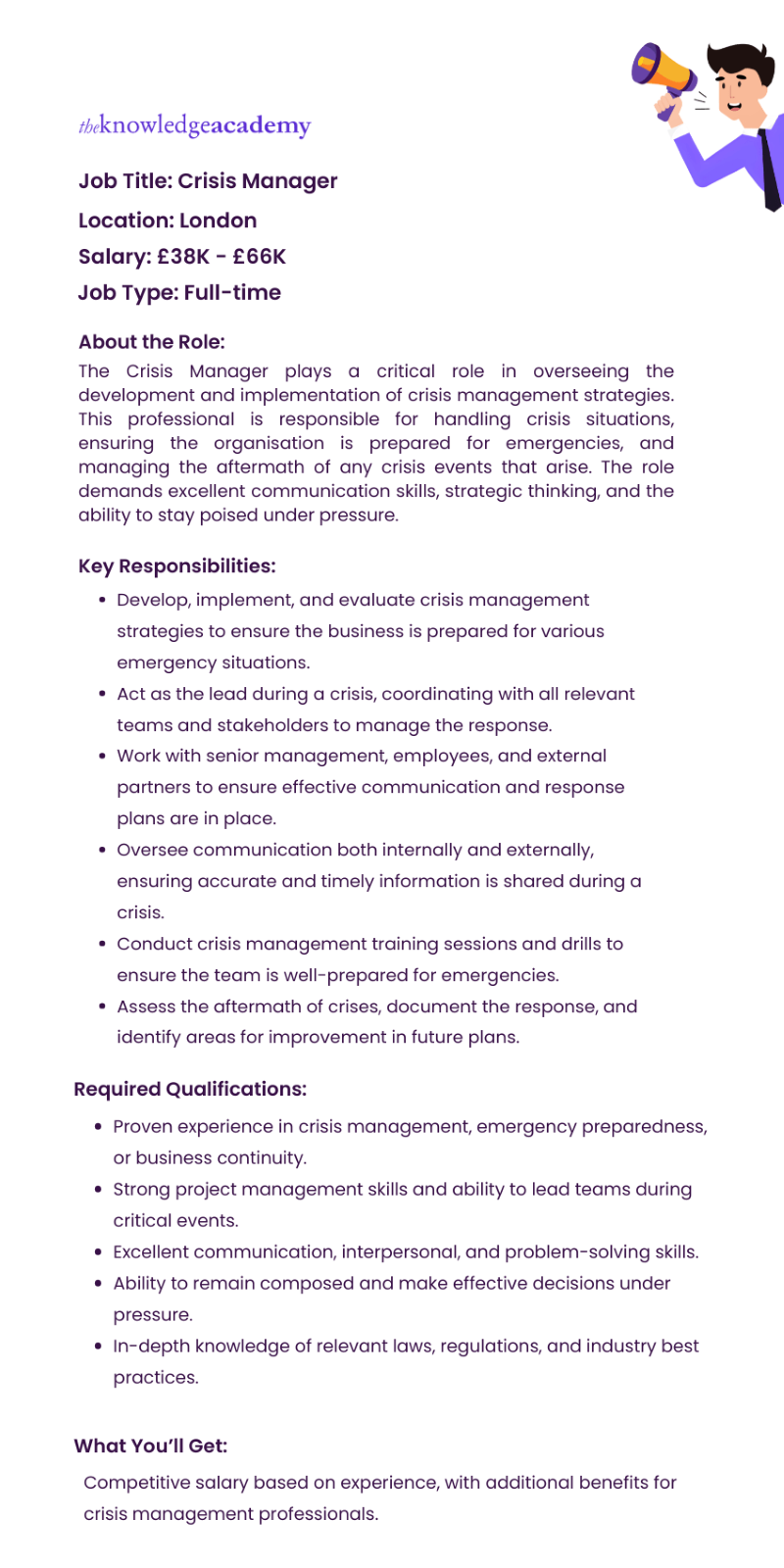
Learn to boost business processes— Join our Business Process Improvement Training today!
Conclusion
This blog provides a comprehensive overview of the role of a Crisis Manager, detailing key responsibilities, qualifications, and skills required for success in Crisis Management. If you are able to take on challenging roles with rewarding opportunities, Crisis Manager is the role you should look up to. You should possess strong collaboration and communication skills along with the skills mentioned in this blog. Lastly, the Crisis Management Job Description mentioned in this blog will clarify your doubts about this role.
Tackle Anti-social Behaviour effectively—Sign up for our Anti-Social Behaviour Management Training now!
Frequently Asked Questions

The best way to handle a crisis is to stay calm, analyse the situation well, and create a clear plan of action. Communicate effectively with all stakeholders, make informed decisions quickly, and adapt as needed. Prioritise safety, manage resources and evaluate the response to improve future preparedness.

The five rules for crisis management are to stay calm and composed, communicate effectively and frequently, and assess the situation based on facts. It's also crucial to prioritise safety and critical needs and be flexible by adapting strategies as the crisis unfolds. These rules help guide decision-making in high-pressure situations.

The Knowledge Academy takes global learning to new heights, offering over 30,000 online courses across 490+ locations in 220 countries. This expansive reach ensures accessibility and convenience for learners worldwide.
Alongside our diverse Online Course Catalogue, encompassing 19 major categories, we go the extra mile by providing a plethora of free educational Online Resources like News updates, Blogs, videos, webinars, and interview questions. Tailoring learning experiences further, professionals can maximise value with customisable Course Bundles of TKA.

The Knowledge Academy’s Knowledge Pass, a prepaid voucher, adds another layer of flexibility, allowing course bookings over a 12-month period. Join us on a journey where education knows no bounds.

The Knowledge Academy offers various Management Courses, including Crisis Management Training, Performance Management Training, and Anti-Social Behaviour Management Training. These courses cater to different skill levels, providing comprehensive insights into 11 Essential Management Theories Used By Managers.
Our Business Skills Blogs cover a range of topics related to Business Management, offering valuable resources, best practices, and industry insights. Whether you are a beginner or looking to advance your professional skills, The Knowledge Academy's diverse courses and informative blogs have got you covered.
Upcoming Business Skills Resources Batches & Dates
Date
 Crisis Management Training
Crisis Management Training
Fri 24th Jan 2025
Fri 28th Mar 2025
Fri 23rd May 2025
Fri 25th Jul 2025
Fri 26th Sep 2025
Fri 28th Nov 2025







 Top Rated Course
Top Rated Course



 If you wish to make any changes to your course, please
If you wish to make any changes to your course, please


